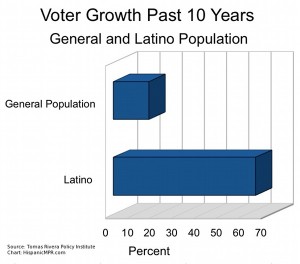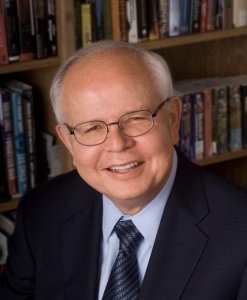Posted by Elena del Valle on June 7, 2010

Click on image to enlarge
Photo: Tomas Rivera Policy Institute
In the past ten years the Hispanic vote has increased 64 percent from 5.9 million to 9.7 million voters. Compared to the overall population of over 300 million that may not seem like much. On the other hand, the vote of the general population has only increased 16 percent in that same time period. If that growth pattern continues in the decades to come Hispanic voters will have an increasingly loud voice in political matters.
What impact will Hispanic voters have on future elections? For years political candidates, seers, and pundits have speculated and tried to curry favor among Latinos. As the Latino population grows, especially United States born Hispanics and naturalized citizens and their children who are able to vote, this question will become more relevant. Lately, given the increasingly controversial immigration and immigration enforcement issues facing the nation and Latino’s strong stance on them Latino voter participation may be more noticeable than ever.
Last week, the Tomás Rivera Policy Institute at the University of Southern California (TRPI) released new data that addresses the potential importance of the Latino vote in some states. The Institute researchers examined data from the United States Census for the 2008 elections to estimate the percent of the Hispanic vote it would take to cause a 1 percent shift in the statewide election in the eight states with the largest Hispanic population. According to their analysis, a shift of 2.3 percent of Hispanic voters in California to another statewide party or candidate “results in that candidate increasing their percent of the overall vote and conversely decreasing the percentage of the vote for the opposing candidate.”

Harry Pachon, president, Tomas Rivera Policy Institute
“Various national surveys indicate that while sixty plus percent of the general electorate favor local immigration enforcement, close to three out of four Hispanics oppose such policies due to fear of discrimination,” said Harry Pachon, PhD, president, Tomás Rivera Policy Institute. “Will Hispanic voters remember this issue in the fall and associate it with parties or candidates when general elections are held in November?”
Founded in 1985, the Tomás Rivera Policy Institute (TRPI) mission is to advance informed policy on “key issues affecting Latino communities through objective and timely research contributing to the betterment of the nation.” TRPI is an affiliated research unit of the University of Southern California School of Policy, Planning, and Development, and is associated with the Institute for Social and Economic Research and Policy at Columbia University.
Posted by Elena del Valle on April 13, 2009

Harry Pachon, president and chief executive officer, Tomas Rivera Policy Institute
Photo: Tomas Rivera Policy Institute
Between 2005 and 2006 the number of Voice over Internet Protocol (VoIP) subscribers grew 189 percent from 1.9 million to 5.5 million, proof of the increasing popularity of the Internet based telecommunications option. Although making phone calls online can be a cheap alternative to traditional phone company services, and many Latinos are familiar with VoIP service providers and think the service can offer lower telephone costs, most of the respondents of a recent study have not embraced the technology because they are unfamiliar with how it works or how it can benefit them.
A report by the Tomás Rivera Policy Institute (TRPI) at the University of Southern California indicates for communication services, VoIP adopters spend an average of 13 percent less per month than Internet connectors who do not use VoIP. In addition, VoIP calling rates, especially for international service, are significantly lower than the fees charged by conventional phone service providers.
“Providers of VoIP services are successful in whetting Latinos’ appetites for new and cheaper telecommunication services; but to help individuals and families make the leap and adopt these services, it is going to take well orchestrated efforts to educate and familiarize them with the technology. In this quest, it is critical to form partnerships, especially at the local level, among public, private and non-profit organizations,” said Matthew D. Matsaganis, Ph.D. who authored the report.
As part of the study funded by Zero Divide, Social Impact of Voice over Internet Protocol on Latinos, researchers examined Latino awareness and perceptions of VoIP and Internet-based phone services; Latino attitudes about and use of landline phones, cell phones, computers and the Internet; and how much Latino VoIP users pay for communication services compared to those Latinos who do not rely on VoIP options.
The report is divided into four main parts that outline the VoIP market, provide information about the benefits of VoIP technology and the state of VoIP, as well as VoIP usage among Latinos and related issues.The report presents implications and policy recommendations to improve education, access, and research for Latinos using Internet-based telephony.
“VoIP could help Latino immigrants connect with their homeland families and friends at a relatively low cost,” said Harry Pachon, Ph.D., president of TRPI and professor of Public Policy at the University of Southern California. “However, lower rates of home computer use by Latinos negatively impact the adoption of these less costly VoIP services.”
Founded in 1985, the Tomás Rivera Policy Institute (TRPI) mission is to advance informed policy on “key issues affecting Latino communities through objective and timely research contributing to the betterment of the nation.” TRPI is an affiliated research unit of the University of Southern California School of Policy, Planning, and Development, and is associated with the Institute for Social and Economic Research and Policy at Columbia University.
“Moving Beyond Traditional Media Measurement: measuring conversations and social media” audio recording

Presenter Katie Delahaye Paine, founder, KDPaine & Partners
Find out about
- Issues affecting online public relationships today
- Testing relationships as part of a survey
- Measuring ethnic group relationships
- Measuring foreign language communications in a similar ways to English
- Biggest challenges measuring conversations and social media
- Measuring online relationships with little or no money
Click here for information on “Moving Beyond Traditional Media Measurement”












